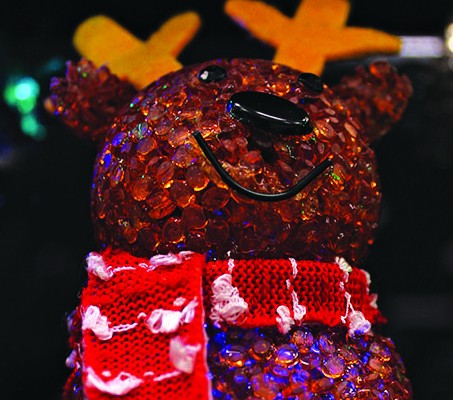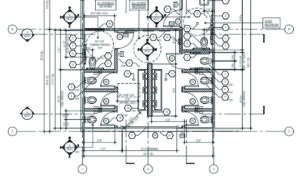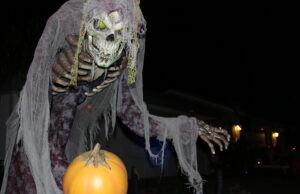The meaning of holidays now

The Heart of Hanukkah
“We wish you a Merry Christ-”
Click. “I wanna wish you a Merry Christ-”
Click. “All I want for Christ-”
Click. Switching from one radio station to the next these days, the ever looming tones of Christmas fill the air. While this music may be enjoyable, there’s more to the holiday season than just Christmas; it’s rare to find many radio stations playing, for example, Hebrew Hanukkah music.
Hanukkah is the eight day Jewish festival of rededication of the Holy Temple, also known as the festival of lights. At the time of the rededication hundreds of years ago, little oil remained in the Temple as the rest had been looted by the Greeks. Oil was needed for the Temple’s menorah, but there was only enough oil to burn for one day. However, a Hanukkah miracle occurred, and it burned for eight days. Thus began the eight day Hanukkah festival created to celebrate the miracle.
During each of the eight days of celebration, blessings are said (called berakhot), and candles are lit, which must burn for at least half an hour. One candle is added each day to the menorah, which is a candelabrum used in Jewish worship. It has eight branches and a central socket.
“Hanukkah is eight nights, so it gives you a lot more time to be festive, and be friendly and have a great time with everyone that you know in the Jewish community,” Shira Goldstein, sophomore, said.
Hanukkah is a holiday filled with traditions. Since Hanukkah is the holiday that celebrates the significance of oil, fried foods are very important to eat during the holiday. One of these fried foods is latkes, or potato pancakes. Another tradition that takes place in many families during Hanukkah is the game, dreidel. Dreidel is a small four-sided spinning top with a Hebrew letter on each side, used to gamble. The letters form the words “a great miracle happened here.”
“We have a big celebration, we cook latkes and we have all of our family come. That’s usually our main celebration,” Evan Milhaupt, sophomore, said. “We get our big presents on the first night and the last night, sort of like symbolizing the beginning and the end.”
Some families, however, are a little more unorthodox in the way they celebrate.
“We usually ignore the first night… and eat Chinese food. We do the prayers on the candles and stuff, but we don’t get presents on the first night in my family. We don’t make latkes or anything, ” Goldstein said.
To Daniel Cohen, senior, his favorite part of the holiday is “spending time with family, and lighting the candles.”
Tiffani Coull, history teacher, also enjoys uniting with her family.
“My favorite part about Hanukkah, it’s like we always have a big Hanukkah dinner, and we get the whole family together,” Coull said.“We do a Passover dinner, the Hanukkah traditions and we tell the story of Hanukkah.”
While Coull grew up a Christian, her husband is of Jewish heritage, so her holiday season is a mixture of Christmas and Hanukkah, known to some as “chrismukkah.”
“We’ve kind of made our own little holiday, and we call it Cousins Christmas, where all of the cousins from both sides of the family get together, and it’s all of us in our twenties and thirties and their kids. We kind of celebrate both Hanukkah and Christmas,” Coull said.
Melting the two traditions of her families has meant a lot to Coull.
“It’s so beautiful to me,” Coull said.
Especially as a history teacher, for Coull,“I love the Jewish history, because they’ve gone through so much, and just the dedication that this religion has to their culture, it’s amazing to me,” she said.“I guess I’m still kind of excited about it, because it’s not something I grew up with. I love it.”
Cohen agreed,“Hanukkah is really fun. We get to play dreidel, eat good food, and we get to spend time with family.”
Remembering the religion and the season
The luminous lights, hectic shopping malls and an abundance of holiday parties and gift exchanges come along with the word “Christmas.” Many have forgotten the religious value behind the holiday and what Christmas is truly supposed to be about. However, the holiday still remains religiously significant to many.
Nick Nagamoto, senior and president of the Catholic Club, celebrates Christmas because it is the “celebration of the birth of Christ.”
“We believe he came into the world to forgive us for our sins and to die on the cross for us, so his birth is a very momentous occasion because it’s God coming down in the flesh,” Nagamoto said.
To Nagamoto, Christmas is not just one day that is celebrated, but rather a season of advent.
“It’s four weeks before Christmas, preparing your heart for the coming of Jesus Christ. You’re supposed to be very humble during this time and pious to really prepare yourself. That way when God comes, you’re ready,” Nagamoto said.
Bella Scott, junior, is very close to the religious ties that come along with the holiday and surrounds herself with people of her faith during the blissful season.
“Every year I go to church on Christmas Eve and also on Christmas Day,” Scott said.
Scott enjoys the spirit that Christmas radiates during the winter as well.
“There’s that old saying, ‘cold hands, warm heart,’ and that’s how Christmas makes me feel,” Scott said.
Christmas caroling, cookie decorating, and ugly sweater parties are all fun during this season of joy, but Nagamoto values the Catholic Christmas traditions as well.
“[The advent wreath] is a wreath with four candles, three of them are purple, one of them is pink, and you light one each week,” Nagamoto explains. Another Catholic tradition Nagamoto partakes in is going to church. “We all go to Mass, we all sing Christmas songs.”
Although Nagamoto practices all the religious ceremonies that come along with the Catholic faith during Christmas, he believes there is no real way to materially celebrate the joyous holiday.
“I know my family always [celebrates] with a tree and whatnot, but that’s really more of an Americanized add-on. Really, the best way is to just spend time with family, and practice the teaching that would be later shared by Jesus,” Nagamoto said.
The commercialization of Christmas
Although Christmas is, at its root, a religious holiday celebrating the birth of Jesus Christ, it has evolved in American culture to become a secular celebration of joyfulness, family, and most importantly, gift giving. Many who practice a religion other than Christianity, or who do not practice any religion, still celebrate the traditions associated with Christmas, such as getting a Christmas tree, putting up lights, and exchanging presents.
Alex Meinhof, senior, is one example of someone who celebrates Christmas without its religious affiliation.
“Religion isn’t a part of my life,” Meinhof said. Despite this, his family annually participates in the Christmas festivities. “We do the whole gift ceremony of course, we have the tree, we have the decorations. I guess we really just do everything but go to church.”
Meinhof feels that what is now really celebrated during the holiday season are the ideas of joy and happiness associated with Christmas.
“The holidays symbolize certain atmospheres,” Meinhof said. “People just kind of latch onto (these feelings) easier than they do something religious.”
In addition to those who do not follow any particular set of religious beliefs, many people celebrate Christmas while still practicing non-Christian religions. Alisha Patel, junior, and her family practice Hinduism, but still celebrate Christmas.
“(I like) how close I feel with my family during Christmas. Like on Christmas Eve we just hang out, have the fireplace going, eat cookies and watch Christmas movies,” she said. “It’s really nice because we’re on break and I’m not stressing as much as usually I am. It’s a warm and happy feeling.”
Patel believes that the “materialistic” quality of Christmas has caused it to gain popularity in American culture.
Robin Lilly, English teacher, has also embraced the secular side of Christmas in her classroom with a Secret Santa gift exchange.
“I try and preface it with the idea that Santa has become a secular figure as part of American culture. I think even if you do not celebrate Christmas, you see it everywhere,” Lilly said. “As a capitalist culture, it’s ubiquitous. Santa’s ubiquitous. You can’t really avoid it.”
Whether it be in movies, advertisements, shopping centers, or music, Santa Claus has become an icon of Christmas media. His image can be seen in most stores as a symbol of the season of giving.
With regards to the gift exchange, Lilly said, “I could probably call it something else, but I also think that as a symbol, Santa represents kindness and giving and jolliness, and so from a symbolic reference, I choose to keep it.”
While Meinhof, Patel, and Lilly have focused on celebrating the secular version of Christmas, Nagamoto believes that it is possible to enjoy both the cultural and religious significance of the holiday.
“I make a distinction between the Catholic Christmas and Christmas the event, like the secular holiday,” Nagamoto said. “Because I’m Catholic, I think it’s rather sad that other people take it only as an occasion to celebrate and party and buy stuff for everyone else. I think it’s fun but it’s not as fulfilling as it would be to really celebrate the true meaning of Christmas.”
However, Nagamoto also addressed the so-called “War on Christmas.” Some Christian celebrations see attempts to remove the religious significance of Christmas from American culture as an attack on the holiday.
“Other people get really angry, like ‘Oh it’s the war on Christmas,’” Nagamoto said. “But I don’t see it that way. I just see it as some people are not perceiving the full extent of what Christmas should be.”



